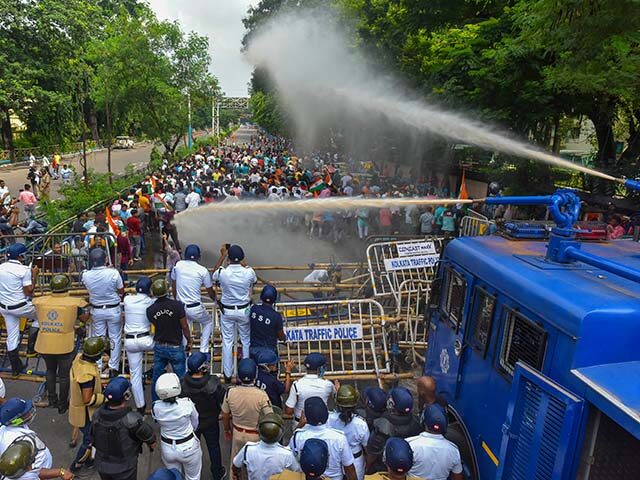Police in India deployed tear gas and water cannons on Tuesday against hundreds of protesters marching in Kolkata to protest unsafe conditions for medical staff.
The protests began after a female trainee doctor was raped and murdered at a hospital in Kolkata on August 9, and soon escalated into nationwide demonstrations and a strike by doctors.
According to local media reports, tear gas was fired after protesters marched on the headquarters of the West Bengal government to demand the resignation of Chief Minister Mamata Banerjee.
The protesters, led by a student group called Paschimbanga Chhatro Samaj, reportedly threw stones as they approached government headquarters. Riot police responded with non-lethal weapons, including tear gas, water cannons, and batons when the demonstrators tried to force their way past police barricades.
Leaders from the BJP Party, which is the governing party nationwide but the opposition in West Bengal, denounced the police response as “brutal” and “repressive.”
BJP called a general strike in West Bengal because Banerjee’s “autocratic regime” is “turning a deaf ear to the voices of the people.”
“Mamata Banerjee’s police are turning on the peace-loving people of the state, who only wanted a safe and secure environment for women,” said BJP state president Sukanta Majumdar.
A spokesman for Banerjee blamed BJP for creating an atmosphere of “lawlessness” in West Bengal that led to violence.
Banerjee, who is female, is under fire from protesters and BJP for allegedly protecting those responsible for the rape and murder of the doctor.
On Tuesday, BJP demanded polygraph tests for Banerjee and Kolkata police commissioner Vineet Goel.
Goel is despised by many of the protesters for supposedly classifying the trainee doctor’s death as a “suicide” at first, although he said the police merely followed standard procedures by initially logging an “unnatural death” and never suggested it was a suicide.
BJP national spokesman Gaurav Bhatia also denounced Kolkata police for using excessive force against protesters.
“Whatever is happening in West Bengal is worrisome. It’s akin to tearing the Constitution to shreds,” Bhatia said.
Opposition politicians – including those from All-India Trinamool Congress (AITC), an offshoot of the major opposition Indian National Congress party founded by Banerjee in 1998 – defended Banerjee and denounced demands for her resignation as “patriarchal.” AITC pointed out on Monday that chief ministers from BJP are not held personally responsible for crimes committed in their states.
The doctor rape scandal appears to be a serious political threat to Banerjee and AITC, which has been the dominant party in West Bengal since 2011. In the eyes of critics, the protests themselves have become evidence that AITC cannot govern effectively or guarantee public order.
ATIC has also been blasted for handling Sandip Ghosh, principal of the hospital where the rape and murder occurred, with kid gloves despite his derelictions of duty and outrageous public statements. Among other controversies, Ghosh apparently did tell the victim’s family that she might have killed herself.
Last Tuesday, India’s Supreme Court issued a scathing reprimand of West Bengal’s government and hospital officials, including the hospital dithering for hours before reporting the murder to police, and the police department’s subsequent failure to protect the hospital from being stormed by an angry mob of protesters on the night of August 14.
“We are deeply concerned about the fact that the name, photo and video clip of the Kolkata rape victim was published all over. The law prohibits publishing victims’ names. Is this the way we provide dignity to the young doctor who has lost her life?” the court added.
The Supreme Court decried the “systemic failure” of India’s medical system to protect doctors, especially female doctors, from attacks by both opportunistic predictors and the anguished families of patients.
Political commentator Kingshuk Nag told the South China Morning Post (SCMP) on Tuesday that many members of AITC have grown disillusioned with Banerjee due to her poor handling of the rape-murder case and protests, but it would be nearly impossible for the party to displace her, as she was its founder and chief architect of its success in winning West Bengal elections.
If Banerjee goes down, AITC might well go down with her. On the other hand, she may well survive the current round of protests because the BJP and its allies in West Bengal have no one of comparable stature to run against her.
“Only coming out on streets won’t stop Mamata Banerjee. There should be a political leader who can take it forward to its logical conclusion, but nobody is there to take the onus,” University of Kalyani professor Pratip Chattopadhyay Nadia told the SCMP.

COMMENTS
Please let us know if you're having issues with commenting.